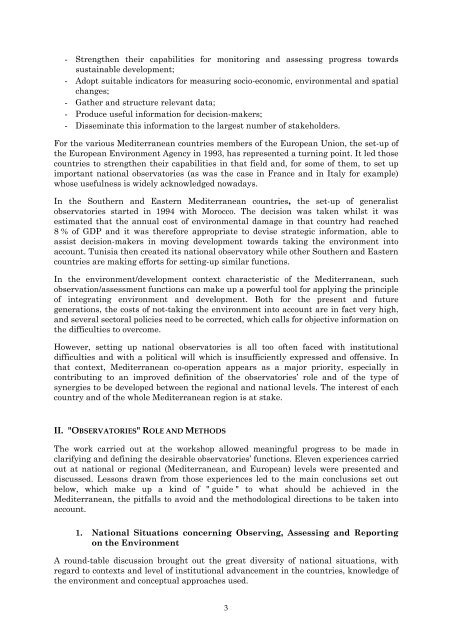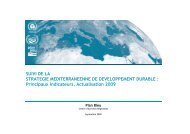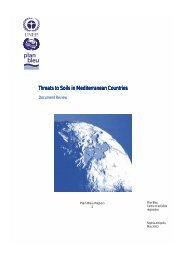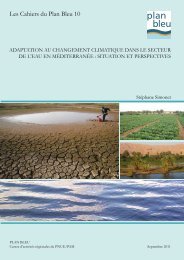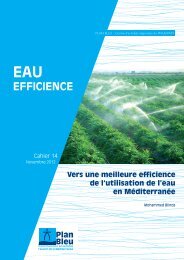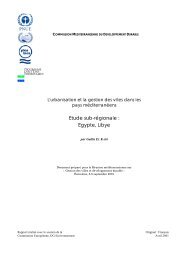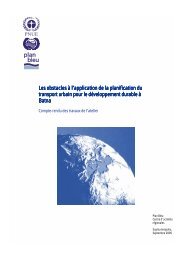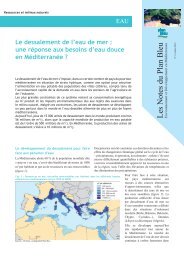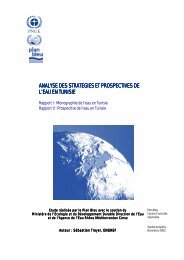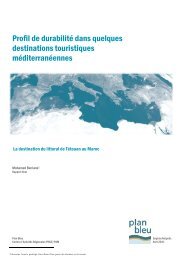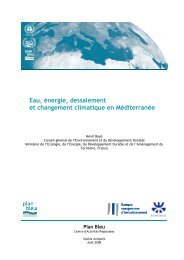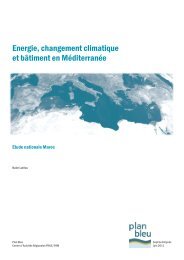Summary and Conclusions - Plan Bleu
Summary and Conclusions - Plan Bleu
Summary and Conclusions - Plan Bleu
Create successful ePaper yourself
Turn your PDF publications into a flip-book with our unique Google optimized e-Paper software.
- Strengthen their capabilities for monitoring <strong>and</strong> assessing progress towards<br />
sustainable development;<br />
- Adopt suitable indicators for measuring socio-economic, environmental <strong>and</strong> spatial<br />
changes;<br />
- Gather <strong>and</strong> structure relevant data;<br />
- Produce useful information for decision-makers;<br />
- Disseminate this information to the largest number of stakeholders.<br />
For the various Mediterranean countries members of the European Union, the set-up of<br />
the European Environment Agency in 1993, has represented a turning point. It led those<br />
countries to strengthen their capabilities in that field <strong>and</strong>, for some of them, to set up<br />
important national observatories (as was the case in France <strong>and</strong> in Italy for example)<br />
whose usefulness is widely acknowledged nowadays.<br />
In the Southern <strong>and</strong> Eastern Mediterranean countries, the set-up of generalist<br />
observatories started in 1994 with Morocco. The decision was taken whilst it was<br />
estimated that the annual cost of environmental damage in that country had reached<br />
8 % of GDP <strong>and</strong> it was therefore appropriate to devise strategic information, able to<br />
assist decision-makers in moving development towards taking the environment into<br />
account. Tunisia then created its national observatory while other Southern <strong>and</strong> Eastern<br />
countries are making efforts for setting-up similar functions.<br />
In the environment/development context characteristic of the Mediterranean, such<br />
observation/assessment functions can make up a powerful tool for applying the principle<br />
of integrating environment <strong>and</strong> development. Both for the present <strong>and</strong> future<br />
generations, the costs of not-taking the environment into account are in fact very high,<br />
<strong>and</strong> several sectoral policies need to be corrected, which calls for objective information on<br />
the difficulties to overcome.<br />
However, setting up national observatories is all too often faced with institutional<br />
difficulties <strong>and</strong> with a political will which is insufficiently expressed <strong>and</strong> offensive. In<br />
that context, Mediterranean co-operation appears as a major priority, especially in<br />
contributing to an improved definition of the observatories’ role <strong>and</strong> of the type of<br />
synergies to be developed between the regional <strong>and</strong> national levels. The interest of each<br />
country <strong>and</strong> of the whole Mediterranean region is at stake.<br />
II. "OBSERVATORIES" ROLE AND METHODS<br />
The work carried out at the workshop allowed meaningful progress to be made in<br />
clarifying <strong>and</strong> defining the desirable observatories’ functions. Eleven experiences carried<br />
out at national or regional (Mediterranean, <strong>and</strong> European) levels were presented <strong>and</strong><br />
discussed. Lessons drawn from those experiences led to the main conclusions set out<br />
below, which make up a kind of " guide " to what should be achieved in the<br />
Mediterranean, the pitfalls to avoid <strong>and</strong> the methodological directions to be taken into<br />
account.<br />
1. National Situations concerning Observing, Assessing <strong>and</strong> Reporting<br />
on the Environment<br />
A round-table discussion brought out the great diversity of national situations, with<br />
regard to contexts <strong>and</strong> level of institutional advancement in the countries, knowledge of<br />
the environment <strong>and</strong> conceptual approaches used.<br />
3


